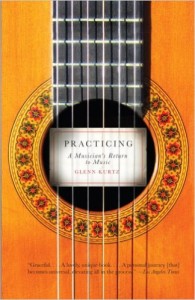 I have read a fair amount of musicians’ biographies and memoirs over the years, though not so many recently, as my curiosities and interests often take me far from music. A couple months ago, however, someone recommended to me a memoir by Glenn Kurtz called Practicing: A Musician’s Return to Music. It is different than any other memoir I have read in that is by someone who chose not to become a professional musician after having spent his life in pursuit of that goal.
I have read a fair amount of musicians’ biographies and memoirs over the years, though not so many recently, as my curiosities and interests often take me far from music. A couple months ago, however, someone recommended to me a memoir by Glenn Kurtz called Practicing: A Musician’s Return to Music. It is different than any other memoir I have read in that is by someone who chose not to become a professional musician after having spent his life in pursuit of that goal.
His memoir, anchored by a single practice session stretched throughout the book, details the early years of his fascination with the guitar, his increasing success as a budding musician, and his studies at New England Conservatory. He then goes on to tell of his “quitting” the guitar and his journey to picking up the guitar again after ten years.
One of the things that makes this book so compelling to me is Kurtz’ ability to look very deeply into the act of practicing, the quest to improve, and learning to perform. There is part of me that wonders if the fact that he chose not to continue a life in music gives him a distance that is so crucial to being able to expose one’s own processes and path so completely. The gaze with which he meets his obstacles (and his successes) is unflinching, so much so that at times while I was reading it, I wondered if I wanted to keep on reading. I generally try to avoid thinking about the process too much.
But the truth is, there is a time and place for that scrutiny, and his ability to put his struggles, and the pathway through those struggles, into words kept pulling me back in. He also navigates the pitfalls of writing about music with such skill. It is an easy subject to sensationalize or sentimentalize, but he keeps it real.
One of my favorite passages of the book is about a masterclass with Pepe Romero in which he played. Romero guides the young guitarist through a piece by playing along with him, highlighting where he is holding onto the music rather than letting it go, showing him where he physically tightens when what is needed is to relax. Reflecting upon the experience he writes, “So I held on to the notes instead of releasing them, trying to control them after they’d sounded, to shape how the audience heard me…. The tension in my elbow was just a cover, a defensive pose against the fear of giving music away and having nothing left for myself, the fear of being nothing….Everything that practicing accumulates and protects, performing releases. It is a squandering of ability, the opposite of striving, the opposite of pretending….to really perform it, I had to be willing to let it go.”
This passage and others on practice and performance dig ever deeper to get to the truth of his experience. It is a book that can be read and enjoyed by musicians (pros, amateurs, students) or non-musicians. All will find something of value. I can also imagine that many family members of young aspiring musicians would gain a valuable peak into the world of their loved one through this book. Check it out!
